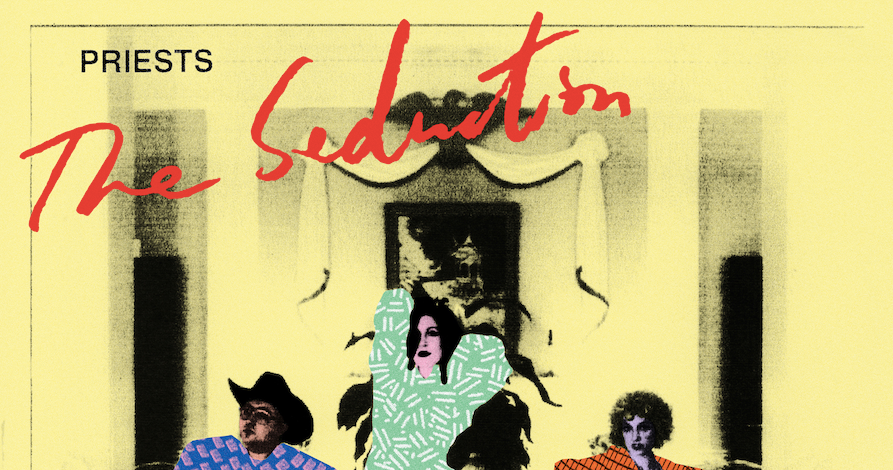Priests want a revolution on ‘The Seduction of Kansas’
by Sofia Bergmann
2019-04-27

Priests
The Seduction of Kansas
Sister Polygon Records · April 5, 2019

The Seduction of Kansas is a great album for radicals, and a terrible album for everyone who disagrees with Priests’ agenda.
In their second politically-charged album of the Trump era, The Seduction of Kansas, Priests is still very angry. Their last album, Nothing Feels Natural, was released upon the presidential inauguration of the contentious Donald Trump. While Priests weren’t the only ones artistically reacting to the country’s turmoil, political unrest provides a perfect incubator for punk rock, especially for an angry female living in a country where presidents “grab em by the pussy.”
When Nothing Feels Natural came out, Priests was able to come off as the band for the times—whether they are or aren’t depends on the extent of one’s sociopolitical nihilism. The Seduction of Kansas could be considered a sequel to Nothing Feels Natural. But unlike most sequels, the plot stays the same: Priests still hates Trump.
The album, however meaningful its poetry, lacks in aesthetic identity: Some tracks speak to the modern anarchist with sonic hints of punk legend Debbie Harry. Listeners undoubtedly air-drum and head-bang to the powerful beats, while other songs feel as though they should be sung by Mic Jagger. Thinking I would make an excellent music producer, I subconsciously listened to their album-opener ‘Jesus’s Son’ with Jagger’s voice-over in my head—and it worked. Perhaps they haven’t mastered a said aesthetic identity, but Priests certainly provides variety and catchy choruses that could be anthems to a modern punk niche.
The Seduction of Kansas, the album’s name and first single which was released in January, left no secrets as to what the album would entail—its music video is even more suggestive: an explicit critique on the ramifications of sexism, capitalism, colonialism, racism and a strong cocktail of all things leftist that leaves a very memorable taste in the mouth.
“68 Projects” is essentially a feminist chant, “Good Time Charlie” addresses the United States’ arming of the Afghan mujahideen in the 1980s, and “Youtube Statre” speaks on modern society with some marxist flirtations such as “There’s no way to overthrow the bourgeoisie / Except tossing a hand grenade / in your society,” alluding to a revolution Priests desperately calls for.
“I’m Clean” is different and opens with a cool surf-like riff from bassist Alexandra Tyson. The ironically and uncomfortably corresponding lyrics however, are about sexual assault, not surfing.
“The bashful smile that begged, ‘Please no’ / The hands that still wanted to know.” A quote which says it all is quickly followed by even more unnerving lyrics: “Cause I’m clean/ You’re free / please act upon me/…Not a single feelin’ inside of me….” Yikes.
While the songs are very catchy, it would be difficult to grant them true artistic merit without the passionate lyrics—which can be problematic depending on ones personal opinions.
They come from a place of progressive social change and anger, and I personally would agree with her urgency and provocativeness. For that reason, The Seduction of Kansas is a great album for radicals, and a terrible album for everyone who disagrees with Priests’ agenda. It further fuels the exact polarization between the far left and right that the album is critiquing. The lyrics risk losing their bearing and coming off as whiney, selfish, pissed-off liberal, millennial propaganda to many potential listeners. Ultimately, Priests are simply vexed American artists trying to make a difference when they’re really just preaching to the choir, and pushing the rest away.
Musically, The Seduction of Kansas has certainly grown on me but the album lacks in first impressions. It wasn’t until track 8, “Not Perceived,” when I challenged my criticisms of the album. Its intro melody requires patience but is soothing and clever, a relieving break from the album’s intensity. The lyrics are touching, and evoke a feeling that you’re reading from your own poetry journal, which is comforting.
The band redeems their flaws by providing samples and tastes of their full potential and artistry in songs like “Not Perceived” and “Texas Instruments.” Greer’s radical views and provocative sound may not be received by everyone, which makes Priests the perfect niche band for the angry liberal punks of the digital age.
